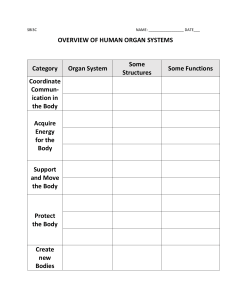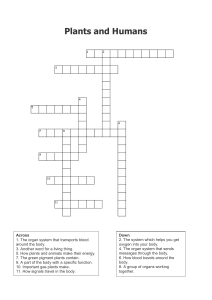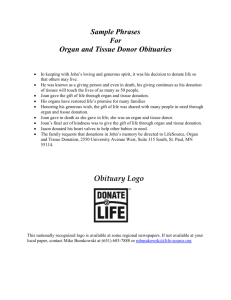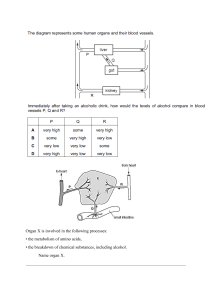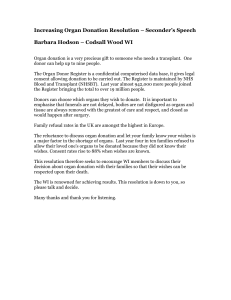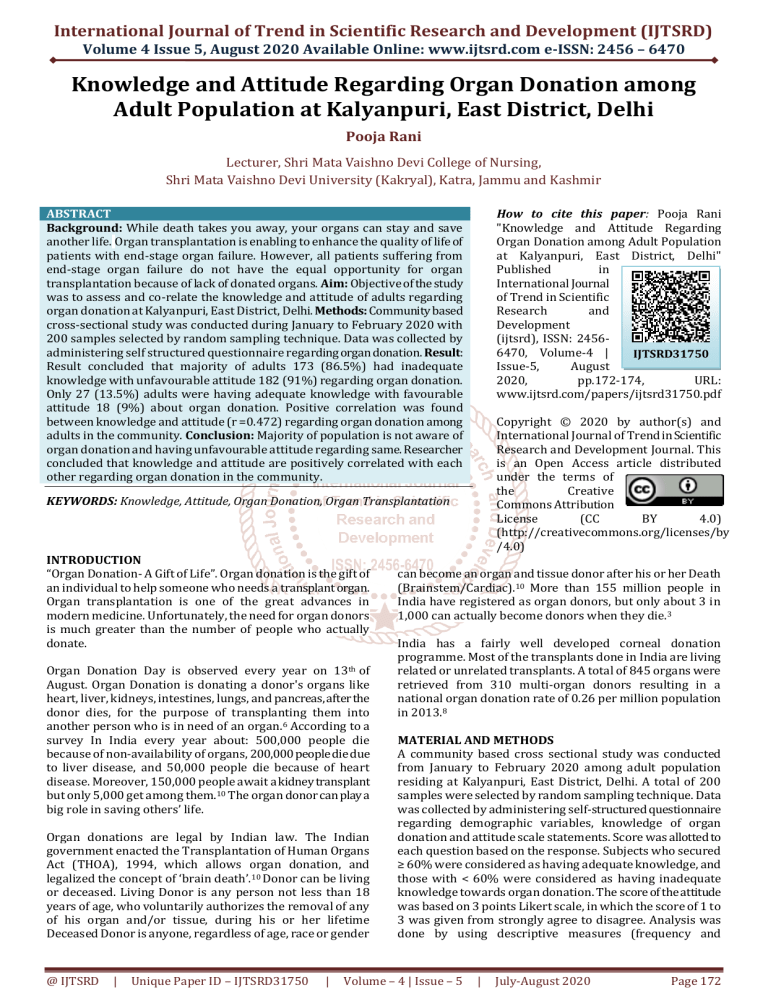
International Journal of Trend in Scientific Research and Development (IJTSRD)
Volume 4 Issue 5, August 2020 Available Online: www.ijtsrd.com e-ISSN: 2456 – 6470
Knowledge and Attitude Regarding Organ Donation among
Adult Population at Kalyanpuri, East District, Delhi
Pooja Rani
Lecturer, Shri Mata Vaishno Devi College of Nursing,
Shri Mata Vaishno Devi University (Kakryal), Katra, Jammu and Kashmir
ABSTRACT
Background: While death takes you away, your organs can stay and save
another life. Organ transplantation is enabling to enhance the quality of life of
patients with end-stage organ failure. However, all patients suffering from
end-stage organ failure do not have the equal opportunity for organ
transplantation because of lack of donated organs. Aim: Objective of the study
was to assess and co-relate the knowledge and attitude of adults regarding
organ donation at Kalyanpuri, East District, Delhi. Methods: Community based
cross-sectional study was conducted during January to February 2020 with
200 samples selected by random sampling technique. Data was collected by
administering self structured questionnaire regarding organ donation. Result:
Result concluded that majority of adults 173 (86.5%) had inadequate
knowledge with unfavourable attitude 182 (91%) regarding organ donation.
Only 27 (13.5%) adults were having adequate knowledge with favourable
attitude 18 (9%) about organ donation. Positive correlation was found
between knowledge and attitude (r =0.472) regarding organ donation among
adults in the community. Conclusion: Majority of population is not aware of
organ donation and having unfavourable attitude regarding same. Researcher
concluded that knowledge and attitude are positively correlated with each
other regarding organ donation in the community.
How to cite this paper: Pooja Rani
"Knowledge and Attitude Regarding
Organ Donation among Adult Population
at Kalyanpuri, East District, Delhi"
Published
in
International Journal
of Trend in Scientific
Research
and
Development
(ijtsrd), ISSN: 24566470, Volume-4 |
IJTSRD31750
Issue-5,
August
2020,
pp.172-174,
URL:
www.ijtsrd.com/papers/ijtsrd31750.pdf
Copyright © 2020 by author(s) and
International Journal of Trend in Scientific
Research and Development Journal. This
is an Open Access article distributed
under the terms of
the
Creative
Commons Attribution
License
(CC
BY
4.0)
(http://creativecommons.org/licenses/by
/4.0)
KEYWORDS: Knowledge, Attitude, Organ Donation, Organ Transplantation
INTRODUCTION
“Organ Donation- A Gift of Life”. Organ donation is the gift of
an individual to help someone who needs a transplant organ.
Organ transplantation is one of the great advances in
modern medicine. Unfortunately, the need for organ donors
is much greater than the number of people who actually
donate.
Organ Donation Day is observed every year on 13th of
August. Organ Donation is donating a donor's organs like
heart, liver, kidneys, intestines, lungs, and pancreas, after the
donor dies, for the purpose of transplanting them into
another person who is in need of an organ.6 According to a
survey In India every year about: 500,000 people die
because of non-availability of organs, 200,000 people die due
to liver disease, and 50,000 people die because of heart
disease. Moreover, 150,000 people await a kidney transplant
but only 5,000 get among them.10 The organ donor can play a
big role in saving others’ life.
Organ donations are legal by Indian law. The Indian
government enacted the Transplantation of Human Organs
Act (THOA), 1994, which allows organ donation, and
legalized the concept of ‘brain death’.10 Donor can be living
or deceased. Living Donor is any person not less than 18
years of age, who voluntarily authorizes the removal of any
of his organ and/or tissue, during his or her lifetime
Deceased Donor is anyone, regardless of age, race or gender
@ IJTSRD
|
Unique Paper ID – IJTSRD31750
|
can become an organ and tissue donor after his or her Death
(Brainstem/Cardiac).10 More than 155 million people in
India have registered as organ donors, but only about 3 in
1,000 can actually become donors when they die.3
India has a fairly well developed corneal donation
programme. Most of the transplants done in India are living
related or unrelated transplants. A total of 845 organs were
retrieved from 310 multi-organ donors resulting in a
national organ donation rate of 0.26 per million population
in 2013.8
MATERIAL AND METHODS
A community based cross sectional study was conducted
from January to February 2020 among adult population
residing at Kalyanpuri, East District, Delhi. A total of 200
samples were selected by random sampling technique. Data
was collected by administering self-structured questionnaire
regarding demographic variables, knowledge of organ
donation and attitude scale statements. Score was allotted to
each question based on the response. Subjects who secured
≥ 60% were considered as having adequate knowledge, and
those with < 60% were considered as having inadequate
knowledge towards organ donation. The score of the attitude
was based on 3 points Likert scale, in which the score of 1 to
3 was given from strongly agree to disagree. Analysis was
done by using descriptive measures (frequency and
Volume – 4 | Issue – 5
|
July-August 2020
Page 172
International Journal of Trend in Scientific Research and Development (IJTSRD) @ www.ijtsrd.com eISSN: 2456-6470
percentage, Mean and Standard deviation) and Correlation of
knowledge and attitude scores was calculated using
Pearson’s correlation method.
RESULT
Out of 200 participants, 62 (31%) were males and 138
(69%) were females. Majority of adults 179 (89.5%) were
Hindu in the age group of 26-35 years 97 (48.5%). Out of
200 adults, 71 (35.5%) were educated till primary. Majority
of the adults 79 (39.5%) were housewife (Table 1). Most
common source of information about organ donation was
found to be television 128 (64%) followed by internet/
social sites 52 (26%), other source 11 (5.5%) and friends/
relatives 09 (4.5%) respectively (Figure 1). In the present
study, majority of adults 173 (86.5%) had inadequate
knowledge with unfavourable attitude 182 (91%) regarding
organ donation. Only 27 (13.5%) adults were having
adequate knowledge with favourable attitude 18 (9%) about
organ donation (Table 2). The mean score for knowledge
was 4.56 with SD ±1.01 and the mean score for attitude was
11.98 with SD±0.53 which shows positive correlation
between knowledge and attitude having correlation
coefficient of r =0.472 regarding organ donation among
adults in the community. (Table 3)
Table 1: Frequency and percentage distribution of adults according to demographic variables
Demographic variables
N
%
18-25 yrs
53 26.5
26-35 yrs
97 48.5
Age
36-45 yrs
38
19
>45 yrs
12
6
Male
62
31
Gender
Female
138 69
Primary
71 35.5
Matriculate
60
30
Education
Intermediate
47 23.5
Graduate
22
11
Private job
56
28
Govt. job
15
7.5
Occupation
Self working
50
25
Housewife
79 39.5
Hindu
179 89.5
Muslim
11
5.5
Religion
Christian
02
01
Others
08
4
Television
128 64
Friends / Relatives
09
4.5
Source of information
Internet/ Social sites 52
26
Other source
11
5.5
Table 2: Distribution of overall knowledge and attitude scores of adults in percentage
S. No.
Parameters
N
%
Inadequate
173 86.5
1.
Knowledge scores
Adequate
27 13.5
Unfavourable 182 91
2.
Attitude scores
Favourable
18
9
Table 3: Co-relation between knowledge and attitude regarding organ donation among adults in community
Aspect
Maximum score Range score Mean SD Correlation
Knowledge
10
5
4.56 1.01
0.472
Attitude
15
3
11.98 0.53
@ IJTSRD
|
Unique Paper ID – IJTSRD31750
|
Volume – 4 | Issue – 5
|
July-August 2020
Page 173
International Journal of Trend in Scientific Research and Development (IJTSRD) @ www.ijtsrd.com eISSN: 2456-6470
Figure 1: Source of information regarding organ donation.
DISCUSSION
A cross-sectional study was undertaken to assess the
knowledge and attitude regarding organ donation among
adult population at Kalyanpuri, East District, Delhi, from
January to February 2020. The data was collected using self
structured questionnaire from 200 study subjects which
were selected by random sampling technique to assess their
knowledge regarding organ donation. The data collected was
analyzed by using inferential statistics and correlation of
knowledge and attitude scores was calculated using
Pearson’s correlation method. In the present study, majority
of adults 173 (86.5%) had inadequate knowledge with
unfavourable attitude 182 (91%) regarding organ donation.
Only 27 (13.5%) adults were having adequate knowledge
with favourable attitude 18 (9%) about organ donation The
researcher found positive correlation between knowledge
and attitude of adults regarding organ donation (r =0.472).
CONCLUSION
Organ transplantation is one of the great advances in
modern medicine. Unfortunately, the need for organ donors
is much greater than the number of people who actually
donate. From the present study researcher concluded that
majority of population is not aware of organ donation and
having unfavourable attitude regarding same. Researcher
concluded that knowledge and attitude are positively
correlated with each other regarding organ donation in the
community. Efficient measures should be taken to educate
the general population with relevant information with the
involvement of media, health personnel, non-governmental
organizations like GYOF (Gift your organ foundation) and
MOHAN foundation and religious scholars.
REFERENCES
[1] Correlation.
Available
at:
http://stattrek.com/statistics/dictionary.aspx/Correla
tion
[2] GS Adithyan1, M Mariappan2, KB Nayana. A study on
knowledge and attitude about organ donation among
medical students in Kerala, 2017, Indian J of
Transplantation, Volume 11, Issue 3, Page : 133-137
@ IJTSRD
|
Unique Paper ID – IJTSRD31750
|
[3] Health Resource and Service Administration (HRSA),
Organ
Donor.gov;
https://www.organdonor.gov/about/process.html
[4] Kishore Y. Jothula, Sreeharshika D. Study to assess
knowledge, attitude and practice regarding organ
donation among interns of a medical college in
Telangana, India, 2018, International Journal of
Community Medicine and Public Health, Vol. 5, No. 4
[5] Mahboob Pouraghaei, Mohammad Tagizadieh, Ali
Tagizadieh, Payman Moharamzadeh, Samaneh
Esfahanian, and Kavous Shahsavari Nia. Knowledge and
Attitude Regarding Organ Donation among Relatives of
Patients Referred to the Emergency Department, 2015
Winter; 3(1): 33–39 (NCBI)
[6] National Health Portal, Gateway of authentic health
information;
https://www.nhp.gov.in/OrganDonation-Day_pg
[7] Naina Sam, R Ganesh, V Indrapriyadarshini, S
Jeyamarthan, CK Nandhini. Awareness, knowledge, and
attitude regarding organ donation among final year
students of medical, Dental, Engineering, and Arts and
Science Colleges in Thiruvallur and Chennai City, India,
2018, Indian Journal of Transplantation, Volume 12,
Issue 1, Page : 25-29
[8] Organ
Donation
In
India;
https://en.wikipedia.org/wiki/Organ_donation
[9] Prince Alex, K. G. Kiran, Sharon Baisil, Sanjeev Badige.
Knowledge and attitude regarding organ donation and
transplantation among medical students of a medical
college in South India, 2017, International Journal of
Community Medicine and Public Health, Vol. 4, No. 9
[10] The
Better
India,
The
Better
Home;
https://www.thebetterindia.com/75687/organdonation-india/
[11] Vaishaly K. Bharambe, Hetal Rathod, Kalpana Angadi.
Knowledge and Attitude Regarding Organ Donation
among Medical Students , 2017, BANTAO Journal ,
Volume 14: Issue 1
Volume – 4 | Issue – 5
|
July-August 2020
Page 174

